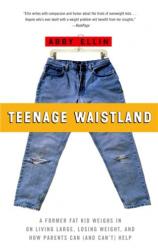Teenage Waistland: A Former Fat-camper Weighs in on Living Large, Losing Weight, and How Parents Can (and Can't) Help
Review
Teenage Waistland: A Former Fat-camper Weighs in on Living Large, Losing Weight, and How Parents Can (and Can't) Help
Prepare to laugh, cry and cringe --- but also to learn --- as Abby Ellin leads us through the landscape of obese teen life. First, though, a confession: When I volunteered to read this book, I feared that I was facing a hard, long slog through a dry tome packed with scientific studies on how to help an overweight kid drop a few pounds. Instead, I could barely put down this lively read. Ellin keeps a page-turning pace as she skillfully weaves her own story as a heavy, weight-obsessed teenager through the stories of other such adolescents.
Ellin begins with her own family, who courageously support her by not challenging her right to tell the unvarnished truth about the ways in which her home contributed to her weight problems and food fixations. Interestingly, the family's attitudes toward weight resulted in the author's sister becoming anorexic. Even as Ellin grew larger and larger, her sister began dieting by third grade.
Ellin's grandmother was a major influence on her self-image, withholding affections when Ellin gained weight. On visits to Grandma's house in Florida, Grandma weighed Ellin daily. At home, Ellin’s mother obsessed over her own weight, restricted her diet and exercised before stepping on the scales each morning. She taped a photo of an obese woman on the refrigerator door. Both grandmother and mother repeatedly drilled into Ellin and her sister the dangers of gaining weight. As a child, Ellin was devastated when her grandmother told her she couldn't come to Florida for a visit at Christmastime unless she lost 15 pounds. The ploy didn't work. Nothing really did, for many long, sad years.
Ellin spent six years at weight-loss camps. She lost weight but also learned more about dysfunctional eating and how to do it (one counselor sneaked Ellin out to buy a cart full of candy and cookies because "Your body's getting used to the diet. You need sugar to give it a jolt."). In describing her fat camp days, she tells us the story of the owners of weight-loss camps, beginning with her visit as an adult with the man who ran the first weight-loss camp Ellin attended. During her visit, she talks with young campers, giving us the first of many insightful conversations with teens seeking to lose weight. What they say about their parents can make a reader weep.
In TEENAGE WAISTLAND, we learn what has helped teenagers lose weight and, (heartbreakingly) more often, what has either not helped them or made them worse. Experts --- from fat camp leaders to directors of weight loss programs to bariatric surgeons, researchers and fat activists (and more) --- represent a variety of attitudes as each discusses the best way to help heavy adolescents. Ellin compassionately presents suggestions to parents on ways to support an obese child, all based on respect.
Although there is not a single solution to such a complicated problem, reading this book is informative and helpful. It is a horrifying and fascinating study in our culture's warped attitude toward food and weight. Even if you don't have a child with weight issues, TEENAGE WAISTLAND is an engrossing read.
Reviewed by Terry Miller Shannon on January 8, 2007
Teenage Waistland: A Former Fat-camper Weighs in on Living Large, Losing Weight, and How Parents Can (and Can't) Help
- Publication Date: January 8, 2007
- Genres: Nonfiction
- Paperback: 288 pages
- Publisher: PublicAffairs
- ISBN-10: 1586484605
- ISBN-13: 9781586484606




